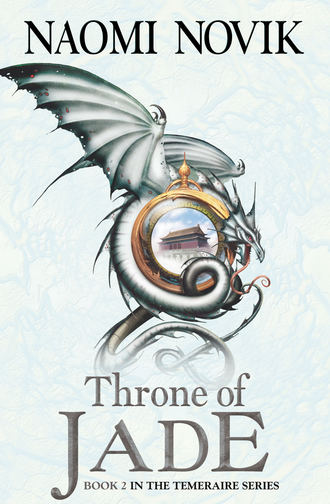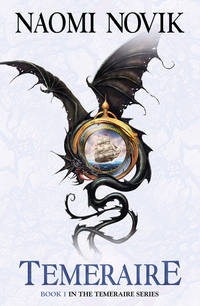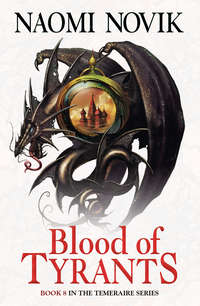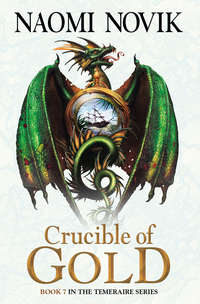
Полная версия
Throne of Jade
Roland led Laurence up to her rooms, sat him in an ugly armchair and gave him a glass of wine. He drank deeply, hiding behind the bowl of the glass from her sympathetic look: he was afraid he might easily be unmanned. ‘You must be faint with hunger, Laurence,’ she said. ‘That is half the trouble.’ She rang for the maid; shortly a couple of manservants climbed up with a very good sort of plain single-course dinner: a roasted fowl, with greens and beef gravy sauce; some small cheese-cakes made with jam, calf’s feet pie, a dish of red cabbage stewed, and a small biscuit pudding for relish. She had them place all the food on the table at once, rather than going through removes, and sent them away.
Laurence did not think he would eat, but once the food was before him he found he was hungry after all. He had been eating very indifferently, thanks to irregular hours and the low table of his cheap boarding-house, chosen for its proximity to the covert where Temeraire was kept; now he ate steadily, Roland carrying the conversation nearly alone and distracting him with service gossip and trivialities.
‘I was sorry to lose Lloyd, of course – they mean to put him to the Anglewing egg that is hardening at Kinloch Laggan,’ she said, speaking of her first lieutenant.
‘I think I saw it there,’ Laurence said, rousing a little and lifting his head from his plate. ‘Obversaria’s egg?’
‘Yes, and we have great hopes of the issue,’ she said. ‘Lloyd was over the moon, of course, and I am very happy for him; still, it is no easy thing to break in a new premier after five years, with all the crew and Excidium himself murmuring about how Lloyd used to do things. But Sanders is a good-hearted, dependable fellow; they sent him up from Gibraltar, after Granby refused the post.’
‘What? Refused it?’ Laurence cried, in great dismay: Granby was his own first lieutenant. ‘Not for my sake, I hope.’
‘Oh Lord, you did not know?’ Roland said, in equal dismay. ‘Granby spoke to me very pretty; said he was obliged, but he did not choose to shift his position. I was quite sure he had consulted you about the matter; I thought perhaps you had been given some reason to hope.’
‘No,’ Laurence said, very low. ‘He is more likely to end up with no position at all; I am very sorry to hear he should have passed up so good a place.’ The refusal could have done Granby no good with the Corps; a man who had turned down one offer could not soon expect another, and Laurence would shortly have no power at all to help him along.
‘Well, I am damned sorry to have given you any more cause for concern,’ Roland said, after a moment. ‘Admiral Lenton has not broken up your crew, you know, for the most part: only gave a few fellows to Berkley out of desperation, he being so short-handed now. We were all so sure that Maximus had reached his final growth; shortly after you were called here, he began to prove us wrong, and so far he has put on fifteen feet in length.’ She added this last in an attempt to recover the lighter tone of the conversation, but it was impossible: Laurence found that his stomach had closed, and he set down his knife and fork with the plate still half-full.
Roland drew the curtains; it was already growing dark outside. ‘Do you care for a concert?’
‘I am happy to accompany you,’ he said, mechanically, and she shook her head.
‘No, never mind; I see it will not do. Come to bed then, my dear fellow; there is no sense in sitting about and moping.’
They put out the candles and lay down together. ‘I have not the least notion what to do,’ he said quietly: the cover of dark made the confession a little easier. ‘I called Barham a villain, and I cannot forgive him asking me to lie; very ungentlemanlike. But he is not a scrub; he would not be at such shifts if he had any other choice.’
‘It makes me quite ill to hear about him bowing and scraping to this foreign prince.’ Roland propped herself upon her elbow on the pillows. ‘I was in Canton harbour once, as a mid, on a transport coming back the long way from India; those junks of theirs do not look like they could stand a mild shower, much less a gale. They cannot fly their dragons across the ocean without a pause, even if they cared to go to war with us.’
‘I thought as much myself, when I first heard,’ Laurence said. ‘But they do not need to fly across the ocean to end the China trade, and wreck our shipping to India also, if they liked; besides they share a border with Russia. It would mean the end of the coalition against Bonaparte, if the Tsar were attacked on his eastern borders.’
‘I do not see the Russians have done us very much good so far, in the war, and money is a low pitiful excuse for behaving like a bounder, in a man or a nation,’ Roland said. ‘The State has been short of funds before, and somehow we have scraped by and still blacked Bonaparte’s eye for him. In any case, I cannot forgive them for keeping you from Temeraire. Barham still has not let you see him at all, I suppose?’
‘No, not for two weeks now. There is a decent fellow at the covert who has taken him messages for me, and lets me know that he is eating, but I cannot ask him to let me in: it would be a court-martial for us both. Though for my own part, I hardly know if I would let it stop me now.’
He could scarcely have imagined even saying such a thing, a year ago; he did not like to think it now, but honesty put the words into his mouth. Roland did not cry out against it, but then she was an aviator herself. She reached out to stroke his cheek, and drew him down to such comfort as might be found in her arms.
Laurence started up in the dark room, sleep broken: Roland was already out of bed. A yawning housemaid was standing in the doorway, holding up a candle, the yellow light spilling into the room. She handed Roland a sealed dispatch and stayed there, staring with open prurient interest at Laurence; he felt a guilty flush rise in his cheeks, and glanced down to be sure he was quite covered beneath the bedclothes.
Roland had already cracked the seal; now she reached out and took the candlestick straight out of the girl’s hand. ‘There’s for you; go along now,’ she said, giving the maid a shilling; she shut the door in the girl’s face without further ceremony. ‘Laurence, I must go at once,’ she said, coming to the bed to light the other candles, speaking very low. ‘This is word from Dover: a French convoy is making a run for Le Havre under dragon guard. The Channel fleet is going after them, but there is a Flamme-de-Gloire present, and the fleet cannot engage without aerial support.’
‘How many ships in the French convoy, does it say?’ He was already out of the bed and pulling on his breeches: a fire-breather was nearly the worst danger a ship could face, desperately risky even with a good deal of support from the air.
‘Thirty or more, packed no doubt to the gills with war materiel,’ she said, whipping her hair into a tight braid. ‘Do you see my coat over there?’
Outside the window, the sky was thinning to a paler blue; soon the candles would be unnecessary. Laurence found the coat and helped her into it; some part of his thoughts already occupied in calculating the likely strength of the merchant ships, what proportion of the fleet would be detached to go after them, how many might yet slip through to safe harbour: the guns at Le Havre were nasty. If the wind had not shifted since yesterday, they had favourable conditions for their run. Thirty ships’ worth of iron, copper, quicksilver, gunpowder; Bonaparte might no longer be a danger at sea after Trafalgar, but on land he was still master of Europe, and such a haul might easily meet his supply needs for months.
‘And just give me that cloak, will you?’ Roland asked, breaking into his train of thought. The voluminous folds concealed her male dress, and she pulled the hood up over her head. ‘There, that will do.’
‘Hold a moment; I am coming with you,’ Laurence said, struggling into his own coat. ‘I hope I can be some use. If Berkley is short-handed on Maximus, I can at least pull on a strap or help shove off boarders. Leave the luggage and ring for the maid: we will have them send the rest of your things over to my boarding-house.’
They hurried through the streets, still mostly empty: night-soil men rattling past with their fetid carts, day labourers beginning on their rounds to look for work, maids in their clinking pattens going to market, and the herds of animals with their lowing breath white in the air. A clammy, bitter fog had descended in the night, like a prickling of ice on the skin. At least the absence of crowds meant Roland did not have to pay much mind to her cloak, and they could go at something approaching a run.
The London covert was situated not far from the Admiralty offices, along the western side of the Thames; despite the location, so eminently convenient, the buildings immediately around it were shabby, in disrepair: where those lived who could afford nothing farther away from dragons; some of the houses even abandoned, except for a few skinny children who peered out suspiciously at the sound of strangers passing. A sludge of liquid refuse ran along the gutters of the streets; as Laurence and Roland ran, their boots broke the thin skim of ice on top, letting the stench up to follow them.
Here the streets were truly empty; but even so as they hurried a heavy cart sprang almost as if by malicious intent from the fog: Roland hauled Laurence aside and up onto the pavement just quick enough he was not clipped and dragged under the wheels. The drover never even paused in his careening progress, but vanished around the next corner without apology.
Laurence gazed down at his best dress trousers in dismay: spattered black with filth. ‘Never mind,’ Roland said consolingly. ‘No one will mind in the air, and maybe it will brush off.’ This was more optimism than he could muster, but there was certainly no time to do anything about them now, and so they resumed their hurried progress.
The covert gates stood out shining against the dingy streets and the equally dingy morning: ironwork freshly painted black, with polished brass locks and unexpectedly, a pair of young Marines in their red uniforms were lounging nearby, muskets leaned against the wall. The gatekeeper on duty touched his hat to Roland as he came to let them in, while the Marines squinted at her in some confusion: her cloak was well back off her shoulders for the moment, revealing both her triple gold bars and her by no means shabby endowment.
Laurence stepped into their line of sight to block their view of her, frowning. ‘Thank you, Patson; the Dover courier?’ he said to the gatekeeper, as soon as they had come through.
‘Believe he’s waiting for you, sir,’ Patson said, jerking his thumb over his shoulder as he pulled the gates to again. ‘Just at the first clearing, if you please. Don’t you worry about them none,’ he added, scowling at the Marines, who looked properly abashed: they were barely more than boys, and Patson was a big man, a former armourer, made only more awful by an eyepatch and the seared red skin about it. ‘I’ll learn them properly, never fret.’
‘Thank you, Patson; carry on,’ Roland said, and on they went. ‘Whatever are those lobsters doing here? Not officers, at least, we may be grateful. I still recall twelve years ago, some Army officer found out Captain St. Germain when she got wounded at Toulon; he made a wretched to-do over the whole thing, and it nearly got into the papers: idiotic affair.’
There was only a narrow border of trees and buildings around the perimeter of the covert to shield it from the air and noise of the city; they almost at once reached the first clearing, a small space barely large enough for a middling-sized dragon to spread its wings. The courier was indeed waiting: a young Winchester, her purple wings not yet quite darkened to adult colour, but fully harnessed and fidgeting to be off.
‘Why, Hollin,’ Laurence said, shaking the captain’s hand gladly: it was a great pleasure to see his former ground-crew master again, now in an officer’s coat. ‘Is this your dragon?’
‘Yes, sir, indeed it is; this is Elsie,’ Hollin said, beaming at him. ‘Elsie, this is Captain Laurence: who I have told you about; he helped me to you.’
The Winchester turned her head around and looked at Laurence with bright, interested eyes: not yet three months out of the shell, she was still small, even for her breed, but her hide was almost glossy-clean, and she looked very well-tended indeed. ‘So you are Temeraire’s captain? Thank you; I like my Hollin very much,’ she said, in a light chirping voice, and gave Hollin a nudge with enough affection in it to nearly knock him over.
‘I am happy to have been of service, and to make your acquaintance,’ Laurence said, mustering some enthusiasm, although not without an internal pang at the reminder. Temeraire was here, not five hundred yards distant, and he could not so much as exchange a greeting with him. He did look, but buildings stood in the line of his sight: no glimpse of black hide was to be seen.
Roland asked Hollin, ‘Is everything ready? We must be off at once.’
‘Yes, sir, indeed; we are only waiting for the dispatches,’ Hollin said. ‘Five minutes perhaps, if you should care to stretch your legs before the flight.’
The temptation was very strong; Laurence swallowed hard. But discipline held: openly refusing a dishonourable order was one thing, sneaking about to disobey a merely unpleasant one something else; and to do so now might well reflect badly on Hollin, and Roland herself. ‘I will just step into the barracks here, and speak to Jervis,’ he said instead, and went to find the man who was overseeing Temeraire’s care.
Jervis was an older man, the better part of both his left limbs lost to a wicked raking stroke across the side of the dragon on which he had served as harness-master; on recovering against all reasonable expectations, he had been assigned to the slow duty of the London covert, so rarely used. He had an odd, lopsided appearance with his wooden leg and metal hook on one side, and he had grown a little lazy and contrary with his idleness, but Laurence had provided him with a willing ear often enough to now find a warm welcome.
‘Would you be so kind as to take a word for me?’ Laurence asked, after he had refused a cup of tea. ‘I am going to Dover to see if I can be of use; I should not like Temeraire to fret at my silence.’
‘That I will, and read it to him; he will need it, poor fellow,’ Jervis said, stumping over to fetch his inkwell and pen one-handed; Laurence turned over a scrap of paper to write the note. ‘That fat fellow from the Admiralty came over again not half an hour ago with a full passel of Marines and those fancy Chinamen, and there they are still, prating away at the dear. If they don’t go soon, I shan’t answer for his taking any food today, so I won’t. Ugly sea-going bugger; I don’t know what he is about, thinking he knows aught about dragons; that is, begging your pardon, sir,’ Jervis added hastily.
Laurence found his hand shook over the paper, so he spattered his first few lines and the table. He answered somehow, meaninglessly, and struggled to continue the note; words would not come. He stood there locked in mid-sentence, until suddenly he was nearly thrown off his feet, ink spreading across the floor as the table fell over; outside a terrible shattering noise, like the worst violence of a storm, a full North Sea winter’s gale.
The pen was still ludicrously in his hand; he dropped it and flung open the door, Jervis stumbling out behind him. The echoes still hung in the air, and Elsie was sitting up on her hind legs, wings half-opening and closing in anxiety while Hollin and Roland tried to reassure her; the few other dragons at the covert had their heads up as well, peering over the trees and hissing in alarm.
‘Laurence,’ Roland called, but he ignored her: he was already halfway down the path, running, his hand unconsciously gone to the hilt of his sword. He came to the clearing and found his way barred by the collapsed ruins of a barracks building and several fallen trees.
For a thousand years before the Romans first tamed the Western dragon breeds, the Chinese had already been masters of the art. They prized beauty and intelligence more than martial prowess, and looked with a little superior disdain at the fire-breathers and acid-spitters valued so highly in the West; their aerial legions were so numerous they had no need of what they regarded as so much showy flash. But they did not scorn all such unusual gifts; and in the Celestials they had reached the pinnacle of their achievement: the union of all the other graces with the subtle and deadly power which the Chinese called the divine wind, the roar with a force greater than cannon-fire.
Laurence had seen the devastation the divine wind wrought only once before, at the battle of Dover, where Temeraire had used it against Napoleon’s airborne transports to potent effect. But here the poor trees had suffered the impact at point-blank range: they lay like flung matchsticks, trunks burst into flinders. The whole rough structure of the barracks, too, had smashed to the ground, the coarse mortar crumbled away entirely and the bricks scattered and broken. A hurricane might have caused such wreckage, or an earthquake, and the once-poetic name seemed suddenly far more apt.
The escort of Marines were nearly all of them backed up against the undergrowth surrounding the clearing, faces white and blank with terror; Barham alone of them had stood his ground. The Chinese also had not retreated, but they were one and all prostrated upon the ground in formal genuflection, except for Prince Yongxing himself, who remained unflinching at their head.
The wreck of one tremendous oak lay penning them all against the edge of the clearing, dirt still clinging to its roots, and Temeraire stood behind it, one foreleg resting on the trunk and his sinuous length towering over them.
‘You will not say such things to me,’ he said, his head lowering towards Barham: his teeth were bared, and the spiked ruff around his head was raised up and trembling with anger. ‘I do not believe you for an instant, and I will not hear such lies; Laurence would never take another dragon. If you have sent him away, I will go after him, and if you have hurt him—’
He began to gather his breath for another roar, his chest belling out like a sail in high wind, and this time the hapless men lay directly in his path.
‘Temeraire,’ Laurence called, scrambling ungracefully over the wreckage, sliding down the heap into the clearing in disregard of the splinters that caught at his clothing and skin. ‘Temeraire, I am well, I am here—’
Temeraire’s head had whipped around at the first word, and he at once took the two paces needed to bring him across the clearing. Laurence held still, his heart beating very quickly, not at all with fear: the forelegs with their terrible claws landed to either side of him, and the sleek length of Temeraire’s body coiled protectively about him, the great scaled sides rising up around him like shining black walls and the angled head coming to rest by him.
He rested his hands on Temeraire’s snout and for a moment laid his cheek against the soft muzzle; Temeraire made a low wordless murmur of unhappiness. ‘Laurence, Laurence, do not leave me again.’
Laurence swallowed. ‘My dear,’ he said, and stopped; no answer was possible.
They stood with their heads together in silence, the rest of the world shut out: but only for a moment. ‘Laurence,’ Roland called from beyond the encircling coils: she sounded out of breath, and her voice was urgent. ‘Temeraire, do move aside, there is a good fellow.’ Temeraire lifted up his head and reluctantly uncurled himself a little so they could speak; but all the while he kept himself between Laurence and Barham’s party.
Roland ducked under Temeraire’s foreleg and joined Laurence. ‘You had to go to Temeraire, of course, but it will look very bad to someone who does not understand dragons. For pity’s sake do not let Barham push you into anything further: answer him as meek as mother-may-I, do anything he tells you.’ She shook her head. ‘By God, Laurence; I hate to leave you in such straits, but the dispatches have come, and minutes may make the difference here.’
‘Of course you cannot stay,’ he said. ‘They are likely waiting for you at Dover even now to launch the attack; we will manage, never fear.’
‘An attack? There is to be a battle?’ Temeraire said, overhearing; he flexed his talons and looked away to the east, as if he might see the formations rising into the air even from here.
‘Go at once, and pray take care,’ Laurence said hastily to Roland. ‘Give my apologies to Hollin.’
She nodded. ‘Try and stay easy in your mind. I will speak with Lenton even before we launch. The Corps will not sit still for this; bad enough to separate you, but now this outrageous pressure, stirring up all the dragons like this: it cannot be allowed to continue, and no one can possibly hold you to blame.’
‘Do not worry or wait another instant: the attack is more important,’ he said, very heartily: counterfeit, as much as her assurances; they both knew that the situation was black. Laurence could not for a moment regret having gone to Temeraire’s side, but he had openly disobeyed orders. No court-martial could find him innocent; there was Barham himself to lay the charges, and if questioned Laurence could hardly deny the act. He did not think they would hang him: this was not a battlefield offence, and the circumstances offered some excuse, but he would certainly have been dismissed the service if he had still been in the Navy. There was nothing to be done but face the consequences; he forced a smile, Roland gave his arm a quick squeeze, and she was gone.
The Chinese had risen and collected themselves, making a better show of it than the ragged Marines, who looked ready to bolt at any moment’s notice. They all together were now picking their way over the fallen oak. The younger official, Sun Kai, more deftly scrambled over, and with one of the attendants offered a hand to the prince to help him down. Yongxing was hampered by his heavy embroidered gown, leaving trailers of bright silk like gaily coloured cobwebs upon the broken branches, but if he felt any of the same terror writ large on the faces of the British soldiers, it did not show in his face: he seemed unshaken.
Temeraire kept a savage, brooding eye upon them all. ‘I am not going to sit here while everyone else goes and fights, no matter what those people want.’
Laurence stroked Temeraire’s neck comfortingly. ‘Do not let them upset you. Pray stay quite calm, my dear; losing our tempers will not improve matters.’ Temeraire only snorted, and his eye remained fixed and glittering, the ruff still standing upright with all the points very stiff: in no mood to be soothed.
Himself quite ashen, Barham made no haste to approach any closer to Temeraire, but Yongxing addressed him sharply, repeating demands both urgent and angry, judging by his gestures towards Temeraire; Sun Kai however stood apart, and regarded Laurence and Temeraire more thoughtfully. At last Barham came towards them scowling, evidently taking refuge from fear in anger; Laurence had seen it often enough in men on the eve of battle.
‘This is the discipline of the Corps, I gather,’ Barham began: petty and spiteful, since his life had very likely been saved by the disobedience. He himself seemed to perceive as much; he grew even angrier. ‘Well, it will not stand with me, Laurence, not for an instant; I will see you broken for this. Sergeant, take him under arrest—’
The end of the sentence was inaudible; Barham was sinking, growing small, his shouting red mouth flashing open and shut like a gasping fish, the words becoming indistinct as the ground fell away beneath Laurence’s feet. Temeraire’s talons were carefully cupped around him and the great black wings were beating in broad sweeps, up, up, up through the dingy London air, soot dulling Temeraire’s hide and speckling Laurence’s hands.
Laurence settled himself in the cupped claws and rode in silence; the damage was done, and Laurence knew better than to ask Temeraire to return to the ground at once: there was a sense of true violence in the force behind his wing-strokes, rage barely checked. They were going very fast. He peered downward in some anxiety as they sped over the city walls: Temeraire was flying without harness or signals, and Laurence feared the guns might be turned on them. But the guns stayed silent: Temeraire was distinctive, with his hide and wings of unbroken black, save for the deep blue and pearlescent grey markings along the edges, and he had been recognized.







